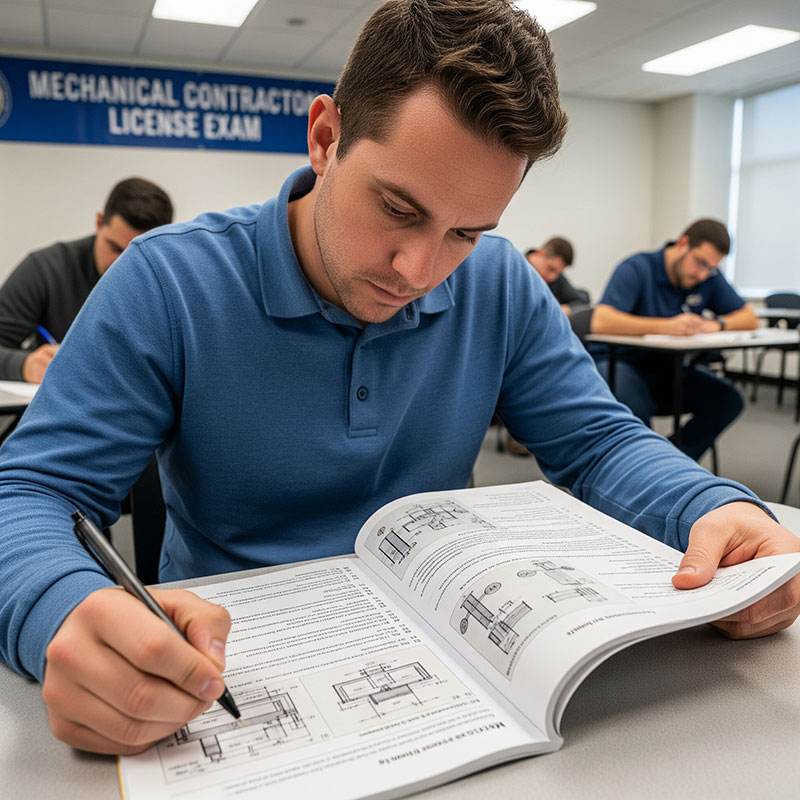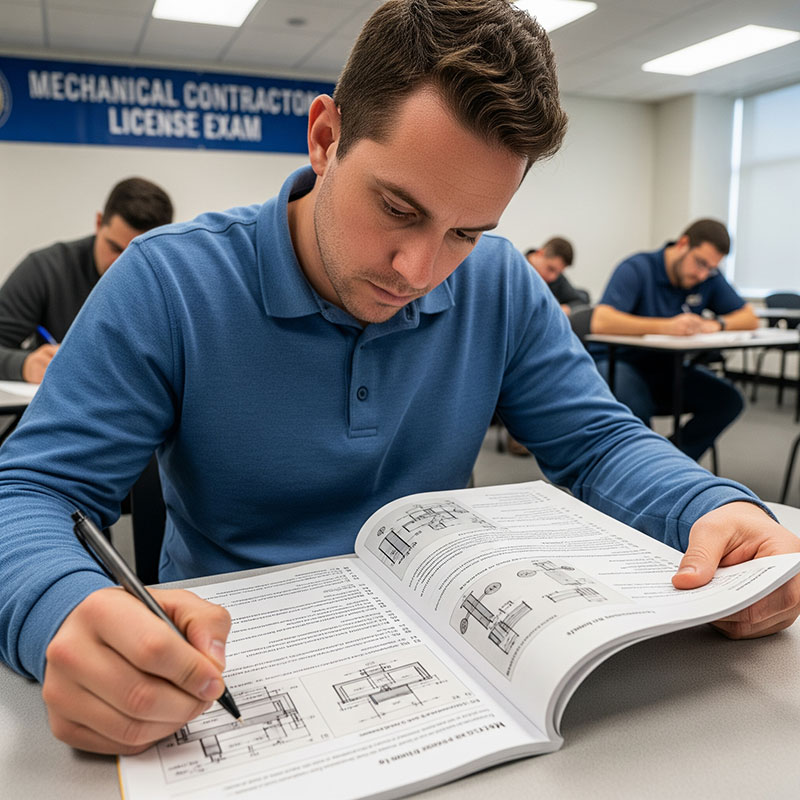Getting Licensed as a Mechanical Contractor – Everything You Should Know


You’re a contractor and you want to go wide and expand what you‘re offering to your clients.
That’s commendable!
But obtaining a license as a mechanical contractor can lead to higher-value work, pretty much guaranteeing you a lucrative career. But to get to that point, you need a licence to prove your technical skills and knowledge.
So, here’s what to expect if you’re thinking of getting your license.
Licensing Requirements (in Most U.S. States)
Most states have the same general framework for getting a mechanical contracting license:
- Pass Exams
To obtain a license as a mechanical contractor, you have to prove your knowledge and pass the trade exam and a business/law exam.
The trade tests are often in the format of multiple choice and usually cover:
- HVAC systems and load calculation
- Electrical components and safety
- Air distribution, insulation
- Fuel gas systems
- Plumbing
- Fire protection
Also, in most states, you are required to pass an exam that covers legal, regulatory, business, and project management topics to make sure contractors know and understand state regulations, labor laws, and lien laws.
- Provide Proof of Work Experience
To get a license from the board, you need to have experience in the field under the supervision of a licensed contractor. In most states, you need to have documented minimum working experience of 3 to 5 years before you can apply for the exam.
- Submit Financial Documents
For a mechanical contracting license, you need to verify that you’re able to take financial responsibility for running a contracting business.
Some documents you have to provide are CPA-reviewed financial statements, proof of insurance, credit reports, letters of reference, and more. Also, some states assign you a monetary license limit to contractors, based on their financial stability.
That limit sets the maximum size/value of individual contracts you’re allowed to take.
- Register with the State Licensing Board
After you submitted the required paperwork and successfully passed exams, the final step is to apply for the license through your state’s licensing board.
In some states (e.g., Tennessee and Florida), you can apply through an online portal, and in some, you need to personally submit your application for a license.
Differences in Licensing Requirements Across the States
The process of getting a license is pretty much the same across the whole United States. But even though the foundation is the same, there are still some differences that will be different depending on where you live.
- Exam structure: In some states (like Tennessee), there are bundled trade exams covering multiple subjects, and in other states, the exam is split into multiple separate tests with different passing scores.
Both options have their pros and cons, but it’s best to be prepared for which one you’re going to get.
- Reciprocity/license portability: Some states (e.g., Florida, Louisiana, North Carolina) participate in a reciprocity agreement, which allows licensed contractors to qualify in another state without having to retake the exam.
But, reciprocity is (often) limited to some license types or requires further verification.
- Insurance requirements: Most states demand general liability, workers’ comp, and sometimes surety bonds. Amounts can depend on project size and value or work type, while some states have set a fixed minimum for all contractors.
- Continuing education (CE): States such as Florida and Oregon demand ongoing CE hours for license renewal, so contractors stay updated on code updates and safety practices.
However, states like Illinois, Alabama, and Tennessee don’t require CE for every license category.
Here are a few examples so that you get a clearer picture:
| State | Required Experience | Required Documentation |
| California | 4yrs as a journeyman or supervisor | Experience proof, fingerprinting, proof of insurance, business license |
| Michigan | 3yrs/6,000 hours or equivalent, some credit for HVAC training | Work experience proof, proof of good moral character (background check, references) |
| Florida | 4yrs, or 1 as foreman and 3 as journeyman | Insurance, background check, business registration |
| Illinois | 5yrs, can be reduced to 1 with apprenticeship | Proof of work experience, age, education |
| Tennessee | 3 years of documented experience | Notarized application, experience affidavit, financial statement, insurance, business registration |
Example: Tennessee
To qualify for a mechanical contractors license in Tennessee, applicants need to complete a process set by the Tennessee Board for Licensing Contractors.
The first step is passing the Tennessee Business and Law exam and the trade exam. Exams are administered by PSI, and study materials are available through PSI and NASCLA bookstores. In order to pass the exam, it’s best to be well prepared so that you don’t waste money and time. To prepare for a Tennessee mechanical contractors license, it’s best to use tutoring or a course to increase your chances of passing on the first go.
It’s also required to submit reviewed financial statements prepared by a licensed CPA to help determine your monetary license limit, and proof of general liability insurance and workers’ compensation coverage.
After that, if you’re working as a corporation, LLC, or partnership, you need to register your business with the Tennessee Secretary of State before applying.
Additional requirements:
- Completed and notarized license application + a 250 USD fee
- List of owners, officers, and the qualifying agent (person who passed the exams)
- Reference letter verifying a minimum of 3 years of experience in mechanical contracting
- Background check
Applicants can start the process online through their licensing portal core.tn.gov. Once you submit your application, it is reviewed by the Board, and if you qualify, you can have a license within 4 to 6 weeks.
Conclusion
Getting licensed as a mechanical contractor is a good, long-term investment in your career. Licences are designed to separate the professionals from amateurs and give you more credibility when getting clients. If you’re negotiating with a potential client and the “Do you have a licence?” question pops up, you’ll likely get the job, while someone without one won’t.
So yeah, it’s definitely worth having one.
Take it one exam and one form at a time, and soon enough, you’ll be licensed, on the job, and running projects.
Stop losing profit.
Build bids in minutes and track every dime with ProfitDig.
Start Risk-Free30-Day Money Back Guarantee